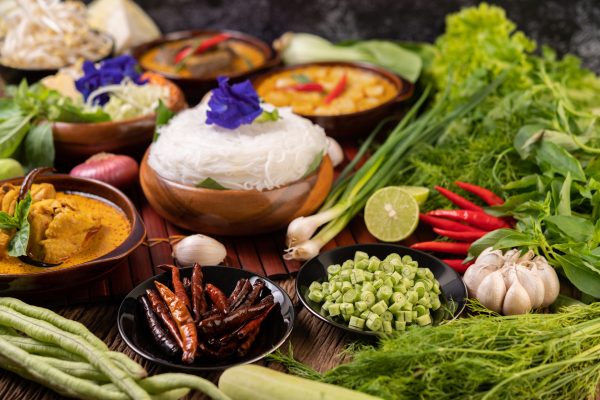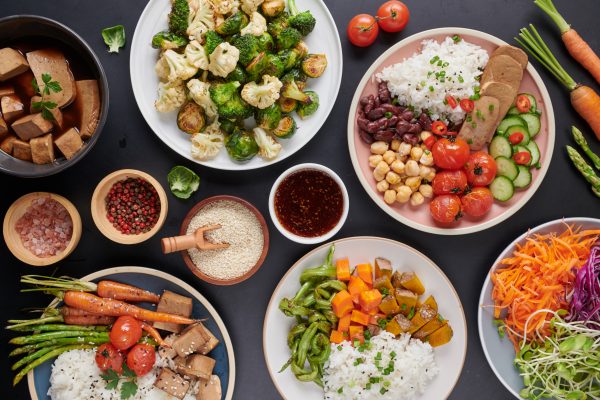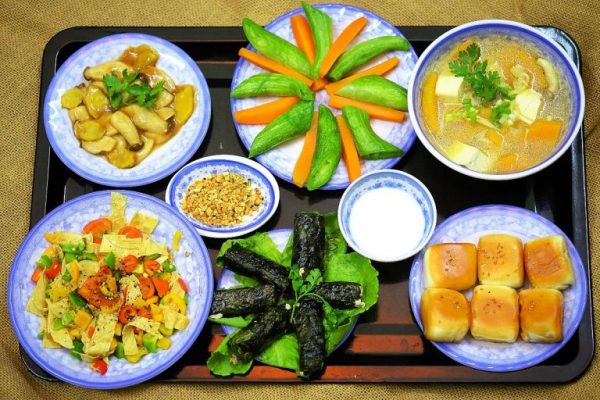Vietnamese Vegetarian Culture Journey: A Culinary Expedition
Contents
1. Overview of Vietnamese Vegetarian Culture
Vietnamese cuisine is celebrated for its vibrant flavors and diverse dishes. In recent years, there has been a noticeable shift toward plant-based eating, giving rise to an intriguing culinary journey known as Vietnamese Vegetarian Cuisine.
Vietnamese Vegetarian Culture, or “An Chay” in Vietnamese, is a culinary style that excludes meat and animal products. It embraces the rich tapestry of flavors found in plant-based ingredients, offering a unique twist to traditional Vietnamese dishes. With a growing awareness of health and environmental concerns, more individuals are embracing vegetarianism. Vietnamese Vegetarian Cuisine reflects this global trend, providing a delicious alternative for those seeking plant-based options.
Explore the Top 10 vegetarian cuisine restaurants in Hanoi.
2. Historical Roots of Plant-based Eating Culture

Influences from Buddhism
The roots of Vietnamese Vegetarianism can be traced back to Buddhist practices that advocate compassion towards all living beings. Monks and nuns traditionally follow a vegetarian diet, and this influence has permeated the broader culinary landscape.
Compassion and Non-Harm: Buddhism’s emphasis on compassion extends to dietary choices, inspiring followers to adopt plant-based diets to minimize harm to animals.
Mindful Eating Practices: Mindfulness, a key aspect of Buddhist philosophy, aligns with plant-based culture by encouraging gratitude for food origins and awareness of the impact of dietary choices.
Vegetarian Traditions: Many Buddhist traditions advocate vegetarianism, influencing both followers and communities to embrace plant-based practices.
Global Cultural Impact: Beyond Buddhist communities, the global popularity of mindfulness practices contributes to the widespread adoption of plant-based lifestyles rooted in compassion and sustainability.
Traditional Ingredients and Techniques
Vietnamese Vegetarian Culture draws from the rich agricultural landscape of Vietnam. Staples like rice, tofu, and an array of fresh vegetables form the foundation of these dishes, showcasing the use of traditional culinary techniques to enhance flavors.
Plant-Based Staples: Grains like rice and quinoa, coupled with legumes such as lentils, form the core of traditional vegetarian cuisines, providing essential nutrients and protein.
Seasonal and Local Embrace: Traditional vegetarian recipes prioritize seasonal and local produce, connecting the cuisine to the environment’s natural rhythms.
Spices and Herbs: A rich array of spices and herbs characterizes vegetarian cooking, enhancing flavors and contributing depth to plant-based dishes.
Diverse Culinary Techniques: From steaming to slow-cooking, traditional vegetarian cooking employs various techniques to preserve nutritional integrity while creating distinct textures and tastes.
Fermentation and Preservation: Techniques like fermentation and preservation are integral, extending shelf life and infusing unique flavors into vegetarian dishes.
3. Health Benefits of Vegetarianism

Nutrient-Rich Ingredients
Vietnamese Vegetarian Cuisine prioritizes nutrient-rich ingredients, offering a plethora of vitamins, minerals, and antioxidants. This not only contributes to overall well-being but also makes these dishes a flavorful and healthy choice.
Plant-Powered Proteins: Legumes, tofu, tempeh, and edamame are protein-rich staples in vegetarian diets, providing essential amino acids for overall well-being.
Whole Grains for Sustained Energy: Quinoa, brown rice, oats, and bulgur offer complex carbohydrates, fiber, and essential nutrients, supporting sustained energy and digestive health.
Nutrient-Dense Leafy Greens: Leafy greens like spinach and kale are nutritional powerhouses, rich in vitamins, minerals, and antioxidants to support immune health.
Colorful Vegetables for Antioxidants: Colorful vegetables such as bell peppers and sweet potatoes provide antioxidants, combating oxidative stress and promoting cellular health.
Healthy Fats from Nuts and Seeds: Almonds, chia seeds, and walnuts offer heart-healthy fats, omega-3 fatty acids, and essential nutrients for brain health.
Calcium-Rich Plant Foods: Tofu, fortified plant-based milk, leafy greens, and sesame seeds serve as calcium-rich alternatives for bone health in vegetarian diets.
Iron from Plant Sources: Lentils, beans, tofu, and fortified cereals contribute plant-based iron to prevent deficiency—a crucial consideration for vegetarian diets.
Vitamin B12 Supplementation: Vegetarian diets may benefit from vitamin B12 supplementation, available through fortified foods and supplements for overall health.
Lowering Cholesterol and Improving Digestion
The absence of animal fats in Vietnamese Vegetarian Cuisine contributes to lower cholesterol levels, promoting heart health. Additionally, the emphasis on fresh vegetables and herbs aids in digestion, making these dishes light and easily digestible.
Probiotics and Digestive Health: Probiotics, found in foods like yogurt and fermented products, promote a balanced gut microbiome, enhancing digestive health. A well-functioning digestive system is essential for nutrient absorption and overall well-being.
Fiber-Rich Foods for Digestive Wellness: Incorporating fiber-rich foods, such as whole grains, fruits, and vegetables, aids digestion by promoting regular bowel movements and preventing constipation. Fiber also helps control blood sugar levels and contributes to a feeling of fullness.
Hydration and Digestive Function: Staying adequately hydrated is crucial for digestive health. Water helps break down food, absorb nutrients, and move waste through the digestive tract, preventing issues like constipation.
Herbs and Spices for Digestive Support: Certain herbs and spices, such as ginger, peppermint, and fennel, have digestive benefits. They can help alleviate indigestion, reduce bloating, and promote overall digestive comfort.
4. Popular Vegetarian Dishes in Vietnam

Pho Chay: The Vegan Twist to Traditional Pho
Pho Chay puts a plant-based spin on the beloved Vietnamese noodle soup. With hearty vegetable broths and a medley of fresh herbs, it captures the essence of traditional Pho while catering to the preferences of vegetarian enthusiasts.
Com Chay: A Flavorful Vegetarian Rice Dish
Com Chay, a vegetarian rice dish, combines fragrant rice with an assortment of seasoned vegetables, creating a wholesome and satisfying meal. The incorporation of plant-based protein sources adds depth to its flavors.
Goi Cuon Chay: Fresh Vegetarian Spring Rolls
Goi Cuon Chay, or vegetarian spring rolls, are a delightful appetizer filled with crisp vegetables, tofu, and vermicelli, wrapped in rice paper. Dipped in a savory peanut sauce, these rolls exemplify the balance of textures and flavors.
Discover more must-try vegetarian dishes in Vietnam.
5. Conclusion
In conclusion, the Vietnamese Vegetarian Culinary Journey is a testament to the rich tapestry of flavors and cultural influences that define Vietnamese cuisine. From traditional dishes to contemporary adaptations, this culinary journey not only caters to the growing demand for plant-based options but also reflects a broader shift towards mindful and sustainable eating.
FAQs
What is the significance of vegetarianism in Vietnamese culture?
Vietnamese vegetarianism holds cultural, religious, and health significance. Many follow a plant-based diet influenced by Buddhist practices, emphasizing compassion and non-harm.
What are common ingredients in Vietnamese vegetarian cuisine?
Key ingredients include tofu, seitan, mushrooms, various vegetables, rice, and noodles. Herbs like basil, mint, and cilantro are also widely used for flavor.
How does Vietnamese vegetarian cuisine differ from non-vegetarian dishes?
Vietnamese vegetarian dishes often substitute meat with plant-based proteins and creatively use flavorful herbs and spices. The focus remains on creating tasty and nutritious meals.
Are there specific festivals or events in Vietnam that celebrate vegetarianism?
Yes, the Vu Lan Festival, associated with filial piety, is a significant time for practicing vegetarianism. During this period, many people, especially Buddhists, adopted a vegetarian diet.
Can I easily find vegetarian options in Vietnam, especially in restaurants?
Absolutely. Many Vietnamese restaurants offer a variety of vegetarian dishes. In larger cities and popular tourist destinations, dedicated vegetarian and vegan restaurants are also prevalent.
What are some must-try Vietnamese vegetarian dishes?
Popular options include Pho Chay (vegetarian noodle soup), Com Chay (vegetarian rice dishes), and Banh Mi Chay (vegetarian Vietnamese baguette). These dishes showcase the diverse and flavorful nature of Vietnamese vegetarian cuisine.
Are there any cultural etiquettes to be aware of when participating in Vietnamese vegetarian practices?
When participating in vegetarian events or dining at a vegetarian household, it’s courteous to adhere to the principles of the occasion, including refraining from consuming meat and alcohol.
How has Vietnamese vegetarian culture evolved over time?
While rooted in traditional values, Vietnamese vegetarian culture has evolved with modern influences. There’s a growing awareness of the health and environmental benefits of plant-based diets.
Can I learn more about Vietnamese vegetarian culture through cooking classes or local experiences?
Absolutely! Many cities offer vegetarian cooking classes where you can learn about traditional ingredients, cooking techniques, and the cultural significance of Vietnamese vegetarian cuisine.
Are there specific regions in Vietnam known for their vegetarian specialties?
Yes, some regions, particularly those with strong Buddhist influences, are renowned for their vegetarian specialties. Hue, for example, is known for its elaborate vegetarian dishes associated with local pagodas.
EHG – Elegance Hospitality Group.
Image source: Collected.